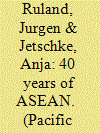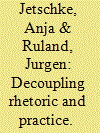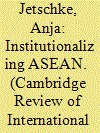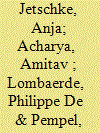|
|
|
Sort Order |
|
|
|
Items / Page
|
|
|
|
|
|
|
| Srl | Item |
| 1 |
ID:
083486


|
|
|
|
|
| Publication |
2008.
|
| Summary/Abstract |
In this introduction, the editors trace the increasing theoretical diversity of ASEAN research and discuss the contributions to this issue against the current state of the art. Contributions confirm the post-Asian crisis advancement of constructivist scholarship, but by also analyzing ASEAN from the Liberal and English school perspectives, the articles assembled in this issue nevertheless stand for theoretical pluralism. This article continues to open a governance perspective and, against this background, attests to ASEAN's marked success in pacifying an erstwhile turbulent world region but also to ASEAN's much more ambiguous record in responding to the new challenges associated with globalization
|
|
|
|
|
|
|
|
|
|
|
|
|
|
|
|
| 2 |
ID:
088450


|
|
|
|
|
| Publication |
2009.
|
| Summary/Abstract |
Why have ASEAN member states declared and why do they continue to declare their intention to enhance cooperation and devise projects when implementation lags behind their rhetoric? Why do they rhetorically commit themselves to cooperation, when they continue to stick to self-interested policies to the detriment of ASEAN's collective interest? And given these diverging practices, how likely is it that the objective of a more legalized and binding cooperation associated with the recently ratified ASEAN Charter is being implemented? This article draws attention to ASEAN's hybrid or dual character of international cooperation, consisting of the emulation of the European integration project and the persistence of deeper cultural strata of Southeast Asia's cooperation project that determine the limits of cooperation: Southeast Asia's social structure and political culture that have not produced those mechanisms that might facilitate international cooperation. If our explanation is correct that cooperation within ASEAN comes about as a simultaneous process of emulation and established cultural practices, we expect change only under specified conditions. Based on our argument and the theoretical literature on normative change, we identify and discuss in greater detail three potential outcomes of change: inertia, localization and transformation. The three modes make different predictions concerning change within ASEAN. Based on an analysis of the two major shocks with which ASEAN has had to contend in the last two decades, namely the Cold War in Asia and the Asian financial crisis, we argue that ASEAN's dominant response to major ideational challenges has been combinations of localization and inertia and has not been followed by a fundamental change of practice
|
|
|
|
|
|
|
|
|
|
|
|
|
|
|
|
| 3 |
ID:
104348


|
|
|
|
|
| Publication |
2011.
|
| Summary/Abstract |
This article provides a new piece for two of the puzzles of institutionalized cooperation in Association of Southeast Asian Nations (ASEAN). First, with regard to the organization's four decades of existence, there has always been a marked gap between ASEAN's rhetorical goals of cooperation and its actual achievements. What explains these systematic failures of implementation? Second, from the outset, ASEAN was criticized for its light institutionalization, which failed to deliver the substantial cooperation goals. Despite selected institutional reforms, ASEAN's autonomy has not increased remarkably and it has not made any major institutional innovations. Why does ASEAN design institutions it does not use? Why does this transformation gap occur? The author suggests a sociological institutional explanation and argues that major impulses for cooperation have come from outside Southeast Asia, most importantly from Europe. By mimicking the European integration process, ASEAN member states have effectively created an isomorphic organization. The Association's institutional development reflects a concern for international legitimacy and less an objective functional demand arising from the specific interactions of member states. This copying process has led to network governance within the organization.
|
|
|
|
|
|
|
|
|
|
|
|
|
|
|
|
| 4 |
ID:
140732


|
|
|
|
|
| Summary/Abstract |
The field of regionalism has been flourishing for some time. Amitav Acharya has been a persistent and powerful voice in the field, and he has contributed to and actively shaped paradigmatic debates within it. His theoretically sophisticated and contextually grounded approach to Southeast Asia's regional order and beyond has inspired countless scholars and better informed generations of students. A group of scholars, therefore, decided to discuss Acharya's contribution to the field of Asian and comparative regionalism more systematically with a view of the balance between disciplinary and area studies, ideas and institutions and non-Western international relations theorizing.
|
|
|
|
|
|
|
|
|
|
|
|
|
|
|
|
| 5 |
ID:
172128


|
|
|
|
|
| Summary/Abstract |
The question of the significance of ASEAN is an important one. Stubbs' observation that different standards have been used to assess the organization is right to the point. This article critically discusses the merits of Stubbs approach and his findings. Our response argues that the binary discussion about ASEAN’s relevance should be replaced by more productive and progressive lines of scientific inquiry, since these questions hardly ever produce the knock-out evidence needed to discard one theory. The more interesting research takes place within paradigms. In the case of institutionalism, this is for example the research program of the design of international institutions. It is here that better data has recently become available, and that some questions that have triggered lively debates on ASEAN can now be answered. We then present select results of a large-N project comparing regional organizations with a view of what we have learned about ASEAN.
|
|
|
|
|
|
|
|
|
|
|
|
|
|
|
|
|
|
|
|
|